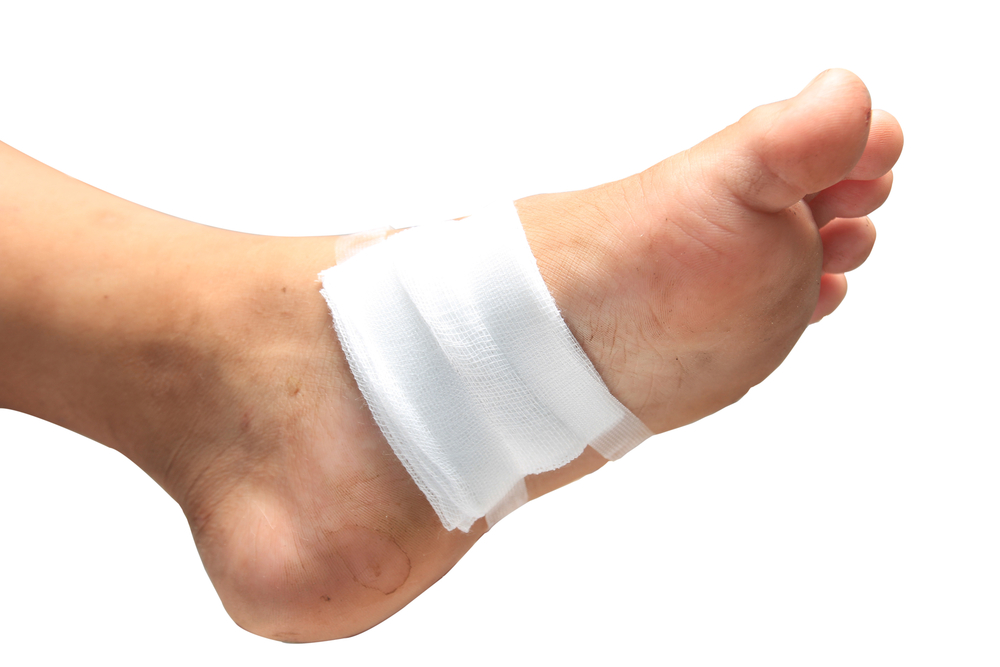Blog
Why Live with Pain and Numbness in Your Feet?
The Feet May Change as We Age
 There are many people that experience unwanted foot conditions as the aging process occurs. This may be a result of poor circulation or a loss of cushioning. It is important to wear shoes that fit properly and are comfortable, and it may be beneficial to measure your feet regularly, which may ensure a correct fit. Circulation may be improved by performing specific foot stretches, in addition to walking frequently during the day. Some of the typical foot ailments that many seniors face may include athlete’s foot, corns and calluses, or dry skin. Diabetic patients may need to check their feet daily for any cuts or bruises that may be present. If these should go unnoticed, complications may arise as a result of the inability to heal properly. If you would like additional information about how to care for elderly feet, it is suggested to speak to a podiatrist who can properly guide you.
There are many people that experience unwanted foot conditions as the aging process occurs. This may be a result of poor circulation or a loss of cushioning. It is important to wear shoes that fit properly and are comfortable, and it may be beneficial to measure your feet regularly, which may ensure a correct fit. Circulation may be improved by performing specific foot stretches, in addition to walking frequently during the day. Some of the typical foot ailments that many seniors face may include athlete’s foot, corns and calluses, or dry skin. Diabetic patients may need to check their feet daily for any cuts or bruises that may be present. If these should go unnoticed, complications may arise as a result of the inability to heal properly. If you would like additional information about how to care for elderly feet, it is suggested to speak to a podiatrist who can properly guide you.
If you need your feet checked, contact Dr. Luz Colon of Absolute Foot & Ankle Specialists Inc.. Our doctor will attend to all of your foot and ankle needs and provide you with quality treatment.
Geriatrics and Podiatry
When people age, some common issues that may occur are bone density loss, dry skin, poor circulation, and rough brittle nails. These issues may also affect your foot health if the necessary steps are not taken to alleviate the problems.
It is important to take care of your feet because feet that are injured or diseased can affect your overall health. Having painful feet hinders your ability to do daily activities or may decrease your willingness to do the things that you need to do.
Visiting Your Geriatrician
As we age, health problems become more likely, so it is essential to visit your doctor for check-ups to ensure that you are doing the best you can to take care of your health. It is recommended to check your feet frequently for any possible cuts, bruises, swelling, corns or any other irregularities.
Taking Care of Elderly Feet
Cracked or dry feet can be treated by applying moisturizer often. It is also important not to wear old socks because the older the sock is, the higher the possibility there will be that there is bacteria there. Wear fresh socks and make sure they fit properly.
Proper foot health means that you can have a more active lifestyle and you will not be bogged down by pain. Foot health also leads to good circulation, which is paramount for overall health.
If you have any questions, please feel free to contact our office located in Miami, FL. We offer the newest diagnostic tools and technology to treat your foot and ankle needs.
Read more about Geriatrics and PodiatryWhat Causes Gout?
 The medical term that is referred to as gout is considered to be a form of arthritis. Patients who develop this condition may often experience severe pain and discomfort in the big toe and surrounding areas, in addition to redness and swelling. Research has shown it may be caused by elevated uric acid levels in the blood, and this may be a result of eating foods that have large amounts of purines. These foods may include red meat, shellfish, and foods or drinks that are high in fructose. There are noticeable symptoms that are associated with gout, including stiffness in the affected joint, severe pain, and swelling. It may be possible to limit the occurrences of gout, and this may be accomplished by implementing lifestyle changes that may help to lower uric acid levels. Eating healthy foods and practicing a gentle exercise regime may help in maintaining a correct weight, which may be beneficial in possibly preventing gout attacks. If you are afflicted with gout, it is suggested to speak to a podiatrist who can properly treat this condition.
The medical term that is referred to as gout is considered to be a form of arthritis. Patients who develop this condition may often experience severe pain and discomfort in the big toe and surrounding areas, in addition to redness and swelling. Research has shown it may be caused by elevated uric acid levels in the blood, and this may be a result of eating foods that have large amounts of purines. These foods may include red meat, shellfish, and foods or drinks that are high in fructose. There are noticeable symptoms that are associated with gout, including stiffness in the affected joint, severe pain, and swelling. It may be possible to limit the occurrences of gout, and this may be accomplished by implementing lifestyle changes that may help to lower uric acid levels. Eating healthy foods and practicing a gentle exercise regime may help in maintaining a correct weight, which may be beneficial in possibly preventing gout attacks. If you are afflicted with gout, it is suggested to speak to a podiatrist who can properly treat this condition.
Gout is a foot condition that requires certain treatment and care. If you are seeking treatment, contact Dr. Luz Colon from Absolute Foot & Ankle Specialists Inc.. Our doctor will treat your foot and ankle needs.
What Is Gout?
Gout is a type of arthritis caused by a buildup of uric acid in the bloodstream. It often develops in the foot, especially the big toe area, although it can manifest in other parts of the body as well. Gout can make walking and standing very painful and is especially common in diabetics and the obese.
People typically get gout because of a poor diet. Genetic predisposition is also a factor. The children of parents who have had gout frequently have a chance of developing it themselves.
Gout can easily be identified by redness and inflammation of the big toe and the surrounding areas of the foot. Other symptoms include extreme fatigue, joint pain, and running high fevers. Sometimes corticosteroid drugs can be prescribed to treat gout, but the best way to combat this disease is to get more exercise and eat a better diet.
If you have any questions please feel free to contact our office located in Miami, FL. We offer the newest diagnostic and treatment technologies for all your foot and ankle needs.
Read more about Everything You Need to Know About GoutDo your Child's Feet Hurt?
Wound Care for People with Diabetes
 In most cases, small lacerations on the feet naturally heal without any complications. Unfortunately, this is not true for those who suffer from diabetes. Foot ulcers are a common problem for those with diabetes, because diabetic neuropathy affects their ability to feel these wounds. Diabetic neuropathy occurs as a result of nerve damage and causes numbness and pain in the hands and feet. Therefore, people with diabetes may not feel an ulcer, which will lead to it not being treated. Some signs of an ulcer are drainage, redness, swelling, and odor. An ulcer that is left untreated will worsen and black tissue called eschar might form. When tissue death occurs because of infection this is called gangrene. Both symptoms can be life-threatening and should be taken very seriously. Those with diabetes should perform daily foot checks to ensure that no ulcers have formed. If you have diabetes and would like more information about how to properly care for your feet, it is recommended you consult with a podiatrist.
In most cases, small lacerations on the feet naturally heal without any complications. Unfortunately, this is not true for those who suffer from diabetes. Foot ulcers are a common problem for those with diabetes, because diabetic neuropathy affects their ability to feel these wounds. Diabetic neuropathy occurs as a result of nerve damage and causes numbness and pain in the hands and feet. Therefore, people with diabetes may not feel an ulcer, which will lead to it not being treated. Some signs of an ulcer are drainage, redness, swelling, and odor. An ulcer that is left untreated will worsen and black tissue called eschar might form. When tissue death occurs because of infection this is called gangrene. Both symptoms can be life-threatening and should be taken very seriously. Those with diabetes should perform daily foot checks to ensure that no ulcers have formed. If you have diabetes and would like more information about how to properly care for your feet, it is recommended you consult with a podiatrist.
Wound care is an important part in dealing with diabetes. If you have diabetes and a foot wound or would like more information about wound care for diabetics, consult with Dr. Luz Colon from Absolute Foot & Ankle Specialists Inc.. Our doctor will assess your condition and provide you with quality foot and ankle treatment.
What is Wound Care?
Wound care is the practice of taking proper care of a wound. This can range from the smallest to the largest of wounds. While everyone can benefit from proper wound care, it is much more important for diabetics. Diabetics often suffer from poor blood circulation which causes wounds to heal much slower than they would in a non-diabetic.
What is the Importance of Wound Care?
While it may not seem apparent with small ulcers on the foot, for diabetics, any size ulcer can become infected. Diabetics often also suffer from neuropathy, or nerve loss. This means they might not even feel when they have an ulcer on their foot. If the wound becomes severely infected, amputation may be necessary. Therefore, it is of the upmost importance to properly care for any and all foot wounds.
How to Care for Wounds
The best way to care for foot wounds is to prevent them. For diabetics, this means daily inspections of the feet for any signs of abnormalities or ulcers. It is also recommended to see a podiatrist several times a year for a foot inspection. If you do have an ulcer, run the wound under water to clear dirt from the wound; then apply antibiotic ointment to the wound and cover with a bandage. Bandages should be changed daily and keeping pressure off the wound is smart. It is advised to see a podiatrist, who can keep an eye on it.
If you have any questions, please feel free to contact our office located in Miami, FL. We offer the newest diagnostic and treatment technologies for all your foot care needs.
Read more about Wound CareHow to Prevent Foot and Ankle Trauma as an Athlete
 Athletes are prone to foot and ankle injuries, because they constantly put strain on both their feet and ankles. Some of the most common injuries among athletes are stress fractures, ankle sprains, plantar fasciitis, and Achilles tendonitis. Thankfully, there are some ways to avoid these complications. Stretching before any sports activity is important to warm up your muscles and stretching helps your body feel less strained after high-intensity activities. Choosing the right shoes is also important in making sure that you are protecting your feet and ankles. Those with high arches will benefit from shoes with cushion, while those with low arches should look for shoes that provide more overall support. The most important part of preventing injury is listening to your body. If something does not feel right, then it is best to modify the activity or the way you perform it in order to avoid larger issues. If you would like additional information on how to cater to your specific foot and ankle needs, then it is suggested you speak with a podiatrist.
Athletes are prone to foot and ankle injuries, because they constantly put strain on both their feet and ankles. Some of the most common injuries among athletes are stress fractures, ankle sprains, plantar fasciitis, and Achilles tendonitis. Thankfully, there are some ways to avoid these complications. Stretching before any sports activity is important to warm up your muscles and stretching helps your body feel less strained after high-intensity activities. Choosing the right shoes is also important in making sure that you are protecting your feet and ankles. Those with high arches will benefit from shoes with cushion, while those with low arches should look for shoes that provide more overall support. The most important part of preventing injury is listening to your body. If something does not feel right, then it is best to modify the activity or the way you perform it in order to avoid larger issues. If you would like additional information on how to cater to your specific foot and ankle needs, then it is suggested you speak with a podiatrist.
Foot and ankle trauma is common among athletes and the elderly. If you have concerns that you may have experienced trauma to the foot and ankle, consult with Dr. Luz Colon from Absolute Foot & Ankle Specialists Inc.. Our doctor will assess your condition and provide you with quality foot and ankle treatment.
Foot and ankle trauma cover a range of injuries all over the foot; common injuries include:
- Broken bones
- Muscle strains
- Injuries to the tendons and ligaments
- Stress fractures
Symptoms
Symptoms of foot and ankle injuries vary depending on the injury, but more common ones include:
- Bruising
- Inflammation/ Swelling
- Pain
Diagnosis
To properly diagnose the exact type of injury, podiatrists will conduct a number of different tests. Some of these include sensation and visual tests, X-rays, and MRIs. Medical and family histories will also be taken into account.
Treatment
Once the injury has been diagnosed, the podiatrist can than offer the best treatment options for you. In less severe cases, rest and keeping pressure off the foot may be all that’s necessary. Orthotics, such as a specially made shoes, or immobilization devices, like splints or casts, may be deemed necessary. Finally, if the injury is severe enough, surgery may be necessary.
If you have any questions, please feel free to contact our office located in Miami, FL. We offer the newest diagnostic and treatment technologies for all your foot care needs.
Read more about Foot and Ankle Trauma







